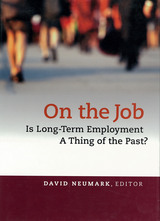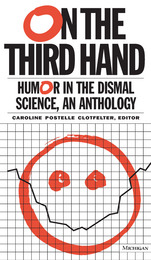11 start with O start with O

In this book, Étienne Helmer offers a comprehensive analysis of oikonomia in ancient Greek philosophy. Despite its similarity to the word “economy,” for the ancients, oikonomia named a branch of knowledge—the science of management—that was aimed at studying the practices we engage in to satisfy our needs. This began with the domestic sphere, but it radiated outward from the oikos (house) to encompass broader issues in the polis (city) as well. Helmer explores topics such as gender roles and marriage, property and the household, the acquisition and preservation of material goods, and how Greek philosophers addressed the issue of slavery in the ancient world. Even if we are not likely to share many of ancient thinkers’ beliefs today, Helmer shows that there was once a way of thinking of “economic life” that went beyond the mere accumulation of wealth, representing a key point of departure for understanding how to inhabit the world with others.






Bringing economic humor into the light of day, Caroline Clotfelter gathers her collection of materials into recognizable categories: economists as others see them, the language and methods of economics, Econ 101, micro- and macroeconomics, and basic economic models and ideas. Aiding and abetting her include such luminaries as John Stuart Mill, George Bernard Shaw, Mad Magazine, Stephen Leacock, Emily Dickinson, Rube Goldberg, Pogo, and John Kenneth Galbraith. As no other, this book will challenge economists to enjoy jokes at their own expense; noneconomists may have even less difficulty finding something funny in this most dismal of sciences.
Caroline Postelle Clotfelter, former Professor of Economics, Mercer University, is now retired.

For nearly thirty years, from the late 1920s to the late 1950s, the keystone of the entire Soviet collective farm system was the network of MTS (machine-tractor stations) which owned, housed, operated, and repaired heavy farm machinery for the surrounding farms. The MTS played fundamental roles in the development of the political, administrative, and ideological, as well as the economic, foundations of Soviet agriculture. Now, years after the demise of the MTS system, its influence can still be discerned in the structural and operational patterns of the agricultural organization. The story of the MTS, of considerable historical interest in its own right, offers numerous vantage points for studying the evolution of Soviet rule in the countryside. In this exhaustive work Robert Miller analyzes the history of the MTS and relates his findings to the development of Soviet administrative policies.
Using data obtained from provincial Party newspapers, official Soviet documents, fictional literature on village life, and interviews with Soviet agricultural specialists familiar with the MTS, Miller explores the combination of economic and political pressures embodied in the MTS system and traces the growth of a characteristically Soviet approach to the problems of administration. In addition to these broad questions of the interaction of the economics and politics, the author examines several specific problem areas, including the function of ideology in the Soviet domestic decision-making process, the principles and practices of Soviet public administration as applied to agriculture, and the development of patterns of Party control in the countryside.
Miller’s study of the MTS reveals the method of Soviet policy-making and policy-implementation to be highly influenced by the leadership style of such men as Stalin and Khrushchev, though practical economic considerations certainly took precedence in important cases. The author observes that ideologically correct procedure was not always felt to be sufficiently effective in times of crises. Two basic modes of administrative control thus became apparent—one for critical periods and another for relatively “normal” periods. An exceptionally thorough work, One Hundred Thousand Tractors will interest students of comparative politics and comparative public administration as well as Soviet specialists.


In part one, Stigler examines the nature of competition and monopoly. In part two he discusses the forces that determine the size structure of industry, including barriers to entry, economics of scale, and mergers. Part three contains articles on a wide range of topics, such as profitability, delivered price systems, block booking, the economics of information, and the kinky oligopoly demand curve and rigid price. Part four offers a discussion of antitrust policy and includes Stigler's recommendations for future policy as well as an examination of the effects of past policies.
"Stigler's writings might well be subtitled 'The Joys of Doing Economics.' He, more than any other contemporary American economist, dispels the gloom surrounding economic theory. It is impossible to confront the subject treated with such humor and verve and come away still believing that economics is the dismal science."—Shirley B. Johnson, American Scholar

The investor-owned corporation is the conventional form for structuring large-scale enterprise in market economies. But it is not the only one. Even in the United States, noncapitalist firms play a vital role in many sectors. Employee-owned firms have long been prominent in the service professions--law, accounting, investment banking, medicine--and are becoming increasingly important in other industries. The buyout of United Airlines by its employees is the most conspicuous recent instance. Farmer-owned produce cooperatives dominate the market for most basic agricultural commodities. Consumer-owned utilities provide electricity to one out of eight households. Key firms such as MasterCard, Associated Press, and Ace Hardware are service and supply cooperatives owned by local businesses. Occupant-owned condominiums and cooperatives are rapidly displacing investor-owned rental housing. Mutual companies owned by their policyholders sell half of all life insurance and one-quarter of all property and liability insurance. And nonprofit firms, which have no owners at all, account for 90 percent of all nongovernmental schools and colleges, two-thirds of all hospitals, half of all day-care centers, and one-quarter of all nursing homes.
Henry Hansmann explores the reasons for this diverse pattern of ownership. He explains why different industries and different national economies exhibit different distributions of ownership forms. The key to the success of a particular form, he shows, depends on the balance between the costs of contracting in the market and the costs of ownership. And he examines how this balance is affected by history and by the legal and regulatory framework within which firms are organized.
With noncapitalist firms now playing an expanding role in the former socialist countries of Eastern Europe and Asia as well as in the developed market economies of the West, The Ownership of Enterprise will be an important book for business people, policymakers, and scholars.
READERS
Browse our collection.
PUBLISHERS
See BiblioVault's publisher services.
STUDENT SERVICES
Files for college accessibility offices.
UChicago Accessibility Resources
home | accessibility | search | about | contact us
BiblioVault ® 2001 - 2024
The University of Chicago Press









